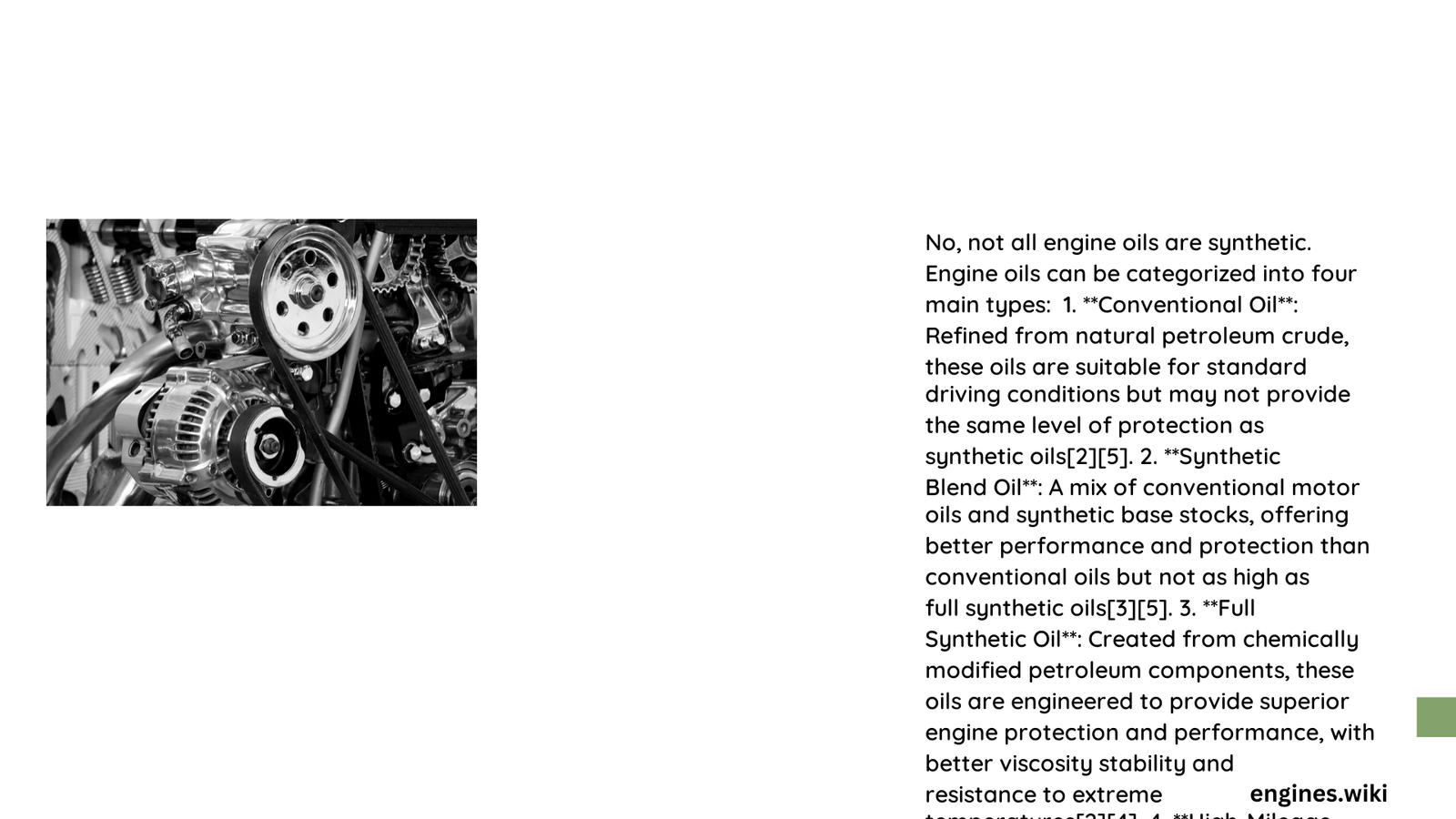Engine oils are complex lubricants with diverse compositions, ranging from conventional to fully synthetic formulations. While not all engine oils are synthetic, the market offers multiple options tailored to different vehicle requirements, performance needs, and budget constraints. Understanding the nuanced differences between oil types is crucial for optimal engine maintenance and longevity.\n\n## What Makes Engine Oils Different?\n\nEngine oils are not uniform in their composition or performance. They can be categorized into three primary types:\n\n1. Conventional Oils\n – Derived directly from crude oil\n – Least expensive option\n – Basic protection for standard driving conditions\n\n2. Synthetic Blend Oils\n – Mixture of conventional and synthetic base stocks\n – Moderate performance enhancement\n – Mid-range pricing\n\n3. Full Synthetic Oils\n – Chemically engineered base stocks\n – Superior performance in extreme conditions\n – Highest price point\n\n### What Percentage of Engine Oils Are Synthetic?\n\n| Oil Type | Market Share |\n|———-|————-|\n| Conventional Oils | 83.2% |\n| Synthetic Blends | 6.3% |\n| Full Synthetic Oils | 10.5% |\n\n## Why Not All Engines Require Synthetic Oil?\n\nThe decision to use synthetic oil depends on multiple factors:\n\n- Vehicle Age: Older engines might not benefit significantly from synthetic oils\n- Driving Conditions: Extreme temperatures or high-performance requirements favor synthetic oils\n- Manufacturer Recommendations: Some vehicles are specifically designed for certain oil types\n\n## How Do Synthetic Oils Differ from Conventional Oils?\n\nSynthetic oils offer several advantages:\n\n- Enhanced Thermal Stability: Maintains performance across temperature ranges\n- Better Viscosity Control: Consistent lubrication under stress\n- Reduced Engine Wear: Provides superior protection against friction\n- Extended Oil Change Intervals: Longer service life compared to conventional oils\n\n## Can You Mix Different Oil Types?\n\nWhile technically possible, experts recommend:\n\n- Avoiding frequent mixing of oil types\n- Consulting vehicle manufacturer guidelines\n- Maintaining consistent oil type for optimal engine performance\n\n## Factors Influencing Oil Selection\n\n1. Vehicle Manufacturer Specifications\n2. Driving Environment\n3. Budget Constraints\n4. Performance Requirements\n5. Engine Age and Condition\n\n## Practical Recommendations\n\n- For newer vehicles: Consider full synthetic oils\n- For older vehicles: Synthetic blends might be more appropriate\n- Always prioritize manufacturer recommendations\n- Regular oil analysis can help determine the best oil type\n\n## Cost-Performance Trade-offs\n\nWhile synthetic oils are more expensive, they often provide:\n\n- Better fuel efficiency\n- Reduced engine wear\n- Extended oil change intervals\n- Improved overall engine protection\n\n## Final Thoughts\n\nNot all engine oils are synthetic, and not every vehicle requires full synthetic oil. The key is understanding your specific vehicle needs, driving conditions, and manufacturer recommendations.\n\n### Reference:\n1. Straits Research Synthetic Lubricants Report\n2. STLE Lubricants Market Analysis\n3. Grand View Research Synthetic Lubricants Market

